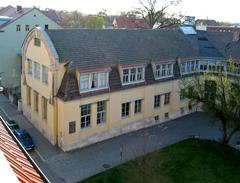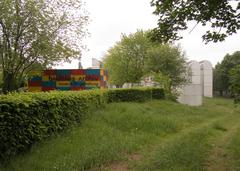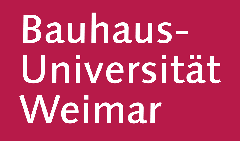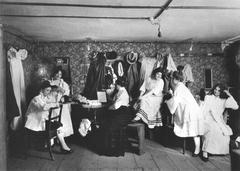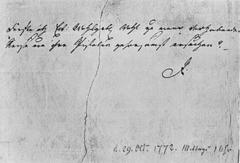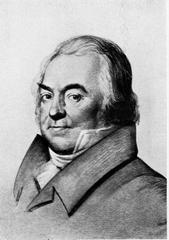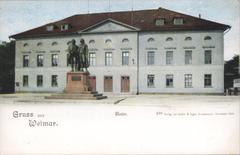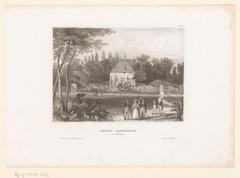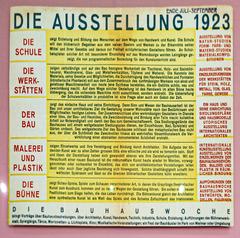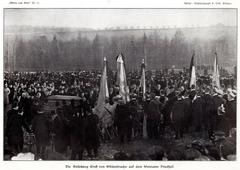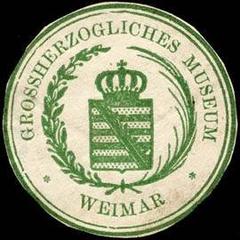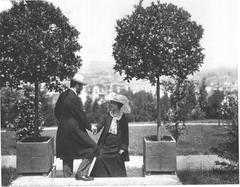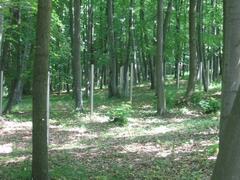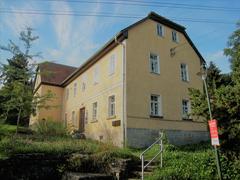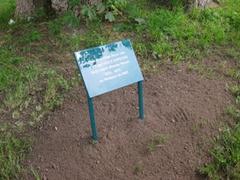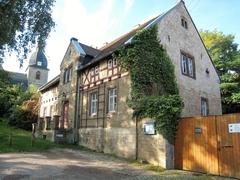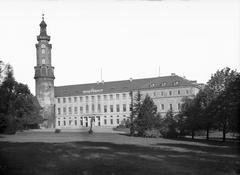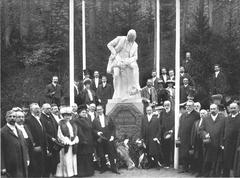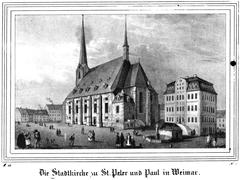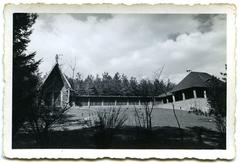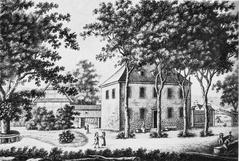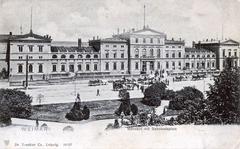Weimarhallenpark: Visiting Hours, Tickets, and Historical Significance in Weimar, Germany
Date: 04/07/2025
Introduction
Weimarhallenpark, centrally located in Weimar, Germany, is a unique fusion of cultural heritage, historical depth, and natural beauty. Once a ducal orchard in the 15th century, this park has evolved into a vibrant urban green space and a focal point for both leisure and major cultural events. Its transformation from aristocratic estate to public park mirrors Weimar’s broader story of innovation, resilience, and artistic significance. This guide provides all the essential information—history, visiting hours, ticketing, accessibility, nearby attractions, and practical tips—to help you make the most of your visit to one of Weimar’s most beloved parks (weimar.de, de.wikipedia.org, weimarhalle.de, kunstfest-weimar.de).
Table of Contents
- Historical Overview
- Visiting Information
- Cultural Events & Festivals
- Community & Family Activities
- Sustainability & Community Engagement
- Practical Visitor Tips
- Frequently Asked Questions (FAQ)
- Plan Your Visit
1. Historical Overview
Early Origins and Aristocratic Ownership
Weimarhallenpark’s story begins in the 15th century as a ducal orchard, serving Weimar’s nobility for over three centuries (weimar.de). In the late 18th century, Friedrich Justin Bertuch—an influential merchant and publisher—acquired the property, initiating significant expansions. Under the Bertuch and Froriep families, the estate flourished, featuring landscaped gardens and the Bertuch family mausoleum, which still stands today (de.wikipedia.org).
19th Century Developments
Around 1800, a shell limestone and travertine stone wall was erected, lending a baroque character to the park. The central pond, with its baroque enclosure wall and cascade, became a defining feature, reflecting the era’s taste for formal garden design (de.wikipedia.org).
Municipal Transition and Urban Integration
In 1925, the estate was sold to the city, marking its shift from private garden to public space (de.wikipedia.org). Integration with the Asbachgrünzug—a green corridor linking city parks—signaled Weimar’s commitment to accessible urban green spaces (zeitsprung.weimar.jetzt). The construction of the original Weimarhalle congress center (1930–32) positioned the park as a cultural and civic landmark.
20th Century Changes
Despite urban reconfigurations during the Nazi era and subsequent changes under East German administration, Weimarhallenpark retained much of its open character. The post-reunification era saw the demolition of the original Weimarhalle and the creation of a modern congress center, revitalizing the park’s role in public life (zeitsprung.weimar.jetzt).
Heritage Status and Modern Significance
Today, the park is a protected cultural monument, celebrated for its layered history and ongoing contributions to Weimar’s cultural scene. Its proximity to the Bauhaus Museum, Galerie Eigenheim, and other landmarks cements its place as a cultural crossroads (de.wikipedia.org).
2. Visiting Information
Opening Hours
- Park: Open daily, 6:00 AM – 10:00 PM, year-round.
- Admission: Free entry to the park; ticketed entry required only for certain events (weimarhalle.de, ticket.erbenhof.de).
Tickets & Admission
- General access: Free.
- Event access: Tickets required for concerts/festivals at the Seebühne or Weimarhalle. Purchase through Weimarhalle official website, Eventfinder, or Erbenhof Ticketing.
- Ticket prices: Vary by event; standing tickets from €59.00, VIP and accessible tickets available.
Accessibility
- Paths: Wheelchair- and stroller-friendly, with paved paths and ramps.
- Restrooms: Accessible facilities near Weimarhalle and throughout the park.
- Parking: Ample car and bicycle parking, including disabled spaces.
- Event accessibility: Reserved seating and discounted tickets for visitors with disabilities (ticket.erbenhof.de).
Guided Tours
- Guided tours available seasonally; inquire at the Weimar Tourist Information.
Getting There
- By train: Weimar Hauptbahnhof, 15-minute walk.
- By bus: Lines 1, 3, 6 to “Weimarhalle” or “Goetheplatz.”
- By car: Parkhaus Weimarhalle (24/7, €1.50–€2.00/hr).
- By bicycle: Racks at main entrances.
Facilities & Photographic Highlights
- Children’s playground
- Central pond (baroque cascade, waterfowl)
- Seebühne (Lake Stage)
- Flowerbeds and mature trees
- Modern Weimarhalle Congress Center
- Event infrastructure: Power, lighting, temporary seating.
3. Cultural Events & Festivals
Weimarhallenpark is renowned for its diverse cultural programming, including:
- Kunstfest Weimar
- Bach Biennale
- Schallkultur Festival
- Yiddish Summer Weimar
- Concerts by Martin Kohlstedt, Gianna Nannini, and the Staatskapelle Weimar
The Seebühne is the region’s largest open-air stage, hosting international and local acts. Event schedules and tickets are available via Weimarhalle, Kunstfest Weimar, Eventfinder, and Songkick.
4. Community & Family Activities
- Seasonal markets: Ostermarkt, Blumenmarkt
- Workshops & art events: Family-friendly programming year-round
- Playgrounds & open lawns: Ideal for picnics and relaxation
- Pet-friendly: Dogs welcome on leash
5. Sustainability & Community Engagement
Weimarhallenpark is maintained with eco-friendly landscaping, tree planting, and waste reduction initiatives. Community groups and volunteers actively participate in park upkeep and event support.
6. Practical Visitor Tips
- Best time to visit: May–September for peak events and blooms; mornings/late afternoons for tranquility.
- What to bring: Picnic blanket, sun protection, camera. Seating (blanket or “Papphocker” stools) for events.
- Food & drink: Bring your own, or enjoy temporary food stalls during events. No permanent vendors.
- Regulations: Alcohol allowed (may be restricted at events); no open fires/barbecues; pets on leash.
- Wi-Fi: Free around Weimarhalle.
- Lost & found: Managed by Weimarhalle.
7. Frequently Asked Questions (FAQ)
- Q: What are the park’s opening hours?
- A: 6:00 AM–10:00 PM daily.
- Q: Is admission free?
- A: Yes; ticketed events excepted.
- Q: How do I buy event tickets?
- A: Online via Weimarhalle, Erbenhof Ticketing, or at the venue.
- Q: Is the park accessible?
- A: Yes; paved paths, accessible restrooms, reserved event seating.
- Q: Can I bring pets?
- A: Yes, on a leash.
- Q: Are guided tours available?
- A: Yes, arrange via Weimar Tourism.
8. Plan Your Visit
Explore the serenity and vibrancy of Weimarhallenpark—whether you’re attending a summer concert, exploring heritage gardens, or relaxing with family, the park offers something for every visitor. For updates, event tickets, and more, visit the official event portal and Weimar tourism website. Enhance your trip with the Audiala app for guided tours and personalized itineraries.
Summary
Weimarhallenpark stands as a testament to Weimar’s enduring cultural spirit, offering a harmonious blend of historic landscaping, modern facilities, and dynamic event programming. Its accessible design, central location, and proximity to major cultural sites make it an essential stop for any Weimar visitor. Whether you’re seeking art, history, or leisurely recreation, Weimarhallenpark delivers a memorable and enriching experience (de.wikipedia.org, weimarhalle.de, weimar.de).
References
- Visiting Weimarhallenpark: History, Tickets, Hours, and Attractions in Weimar, 2025, (weimar.de)
- Weimarhallenpark Wikipedia, 2025, (de.wikipedia.org)
- Weimarhallenpark Visiting Hours, Tickets & Cultural Events Guide in Weimar, 2025, (kunstfest-weimar.de)
- Weimarhalle Official Website, 2025, (weimarhalle.de)
- Weimarhallenpark Visiting Hours, Tickets, and Exploring Weimar’s Historic Green Oasis, 2025, (eventfinder.de)
- Weimarhallenpark Visiting Hours, Tickets & Visitor Guide: Explore Weimar’s Historic Green Oasis, 2025, (ticket.erbenhof.de)
- Zeitsprung Weimar Historical Articles, 2025, (zeitsprung.weimar.jetzt)
